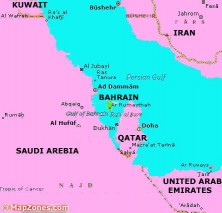Editor’s Note – Things are getting dicey on an hourly basis of late in the Middle East. With the suspension of Syria from the Arab League, Iran vows to back the Assad administration and accuses two Kuwaitis of spying. Meanwhile, Assad’s local supporters gather and attack other Gulf State/Middle East embassies and 26 people are killed in the city of Hama by the Assad Regime.
Then we have Bahrain claiming that Iranian connections aimed to kill other Gulf dignitaries. Though the Arab League took great measures to isolate Assad, they do not think the west will be intervening, even with the recall of many diplomats from Syria back to their Arab homes. On so many levels, and some many fronts, the trigger points just seem to multiply like rabbits in the extremely volatile and densely packed region, with so many players involved.
Stay tuned, it seems just about anything could happen now, and likely will.
Bahrain says terror cell linked to Iran, planned to kill Gulf dignitaries
A cell broken up in Bahrain was linked to Iran’s Revolutionary Guard and planned to murder prominent Gulf figures, Al Arabiya TV reported on Sunday, quoting the prosecutors’ office in Bahrain.
Bahrain’s state news agency BNA earlier reported that Members of the cell, four of them Bahrainis detained in neighboring Qatar, had also planned to attack a causeway joining Bahrain to Saudi Arabia. The suspects’ interrogation led to the arrest of a fifth member of the group in Bahrain, BNA reported.
Some of the suspects had confessed that “the group was set up abroad … to carry out terror operations in Bahrain … and was in coordination with the military overseas, including the Revolutionary Guards and the Basij (militia),” BNA quoted a Bahraini prosecution spokesman as saying.
Bahraini member of parliament Adel Assoumi told Al Arabiya that there “strong evidence” suggests that Iran and the Lebanese Hezbollah group was behind the terrorist cell.
The Gulf Cooperation Council on Sunday urged member states to exercise “caution and vigilance” after Bahrain’s announcement that it has broken up the cell.
“The condition in the region and dangers facing member states require more caution and vigilance in order to thwart criminal attempts at destabilization,” GCC chief Abdullatif al-Zayani said in a statement.
He welcomed the security cooperation between Bahrain and Qatar that he credited with having foiled alleged attacks on the Bahraini interior ministry, the Saudi embassy in Manama, and the causeway linking Saudi Arabia and Bahrain.
“Security coordination and cooperation between the council members will ensure the failure of these destabilizing attempts,” said Zayani.
In an apparent reference to Iran, Zayani said the alleged plot reflected “desperate attempts … of continuous interference in the internal affairs of the kingdom of Bahrain and other GCC countries.”

